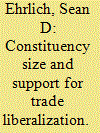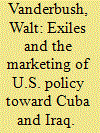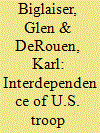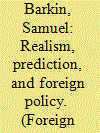| Srl | Item |
| 1 |
ID:
089325


|
|
|
|
|
| Publication |
2009.
|
| Summary/Abstract |
The Bush administration's decision-making process leading to the invasion of Iraq in 2003 has been singled out for its many shortcomings: failure of intelligence; lack of debate concerning options; an insufficient invading force; and poor postwar planning. Contrary to the administration's claim that no one foresaw the difficulties of waging a war in Iraq, many concerns about the challenges the United States would face were raised inside and outside of government. Yet, none of this information had a significant effect on the decision-making process. This paper develops a decision-making model that integrates elements from the individual to the organizational level and explains how important information was marginalized, leading to a poor policy outcome. The model illustrates how the combined effects of the president's formal management style, anticipatory compliance on the part of key players, bureaucratic politics, and the intervening variable of the 9/11 terrorist attacks contributed to a defective decision-making process.
|
|
|
|
|
|
|
|
|
|
|
|
|
|
|
|
| 2 |
ID:
089321


|
|
|
|
|
| Publication |
2009.
|
| Summary/Abstract |
Studies of the political economy of trade frequently rely on the assumption that the larger a policy maker's constituency, the more supportive of free-trade that policy maker will be. Large constituencies are supposed to yield concern for the national interest and provide insulation from particularistic, protectionist interests. This assumption, though, has rarely been directly tested. This article does so by leveraging the variation in district size within the U.S. Congress. This article statistically examines a dataset of roll-call votes on trade legislation from 1994 to 2004 to determine the effect of constituency size and alternative explanations for legislative preferences on foreign economic policy and finds no evidence of the effect of constituency size.
|
|
|
|
|
|
|
|
|
|
|
|
|
|
|
|
| 3 |
ID:
089326


|
|
|
|
|
| Publication |
2009.
|
| Summary/Abstract |
This paper analyses the role of Cuban Americans and Iraqi Americans as allies of like-minded public officials in the marketing of contested foreign policies to the United States public. Each of these ethnic exile communities played a traditional lobbying role as would be expected of interest groups, but the argument here is that the interactive relationship between the ethnic interest groups and government officials in advocating policy is the more interesting development in these cases. While there are differences in the two cases, the similarities between marketing an embargo and an invasion suggest that foreign-policy analysts may want to pay closer attention to the interactive relationship between exile communities and government officials in policy advocacy. I suggest in conclusion that we need to be wary of according defectors and exiles privileged positions in future foreign-policy debates.
|
|
|
|
|
|
|
|
|
|
|
|
|
|
|
|
| 4 |
ID:
089324


|
|
|
|
|
| Publication |
2009.
|
| Summary/Abstract |
The relationship between political conflict and trade has contributed to a riveting discussion in international relations about whether trade produces conflict, or whether conflict itself reduces trade. Most studies proxy "the flag" using militarized interstate disputes (MIDs). However, extensions of "the flag" might well obtain in environments short of MIDs. A more general way to proxy the flag is troop deployments. The deployment of military troops is an essential element of foreign policy. Using panel data for 126 developing countries from 1965 to 2002 and a two-stage least square approach, this essay investigates the relationship between trade and United States troop deployments. We find that trade and troops have a nonrecursive relationship: trade follows the flag and troops follow trade. Given the increased insecurity in the world today, the results are timely and reinforce previous research about the reciprocal relationship between the flag and trade.
|
|
|
|
|
|
|
|
|
|
|
|
|
|
|
|
| 5 |
ID:
089322


|
|
|
|
|
| Publication |
2009.
|
| Summary/Abstract |
Attempts by some contemporary realists to both claim that international politics are objectively predictable and at the same time prescribe particular foreign policies cannot hold together logically, because they are internally contradictory. The core argument of this article is that these attempts not only fail to fulfill their goal, but that the attempt to be scientific, to see the world as predictable, is ontologically incompatible with the core insight of classical realism, that we must see the world as it is, rather than as we want it to be. There are two ramifications of this observation for a realism that is not internally contradictory. The first is that a prescriptive realism must be a theory of foreign policy, not a theory of systems structure. And the second is that a realism that works as a theory of foreign policy prediction needs to be reflexive, needs to examine its own assumptions and biases as an integral part of the process of studying international politics.
|
|
|
|
|
|
|
|
|
|
|
|
|
|
|
|